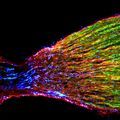Text to go here...
 Scientists have identified the gene that allows the transmission of chronic pain. When the gene was deleted in mice they could no longer feel certain types of pain. This information could allow medicines to be designed to treat long-lasting chronic (neuropathic) pain suffered by millions of people worldwide.
Scientists have identified the gene that allows the transmission of chronic pain. When the gene was deleted in mice they could no longer feel certain types of pain. This information could allow medicines to be designed to treat long-lasting chronic (neuropathic) pain suffered by millions of people worldwide.
Neuropathic pain is different to the pain felt when you cut yourself or touch something hot because it doesn't fade away. It is associated with damaged nerve endings and often occurs in diabetes patients or people undergoing chemotherapy. The pain-killers currently available do not control chronic pain very well and the symptoms of pain are estimated to cost the European economy over €250 billion each year, because around one fifth of people with chronic pain become depressed and many lose their jobs.
The pain transmission gene the scientists deleted is called HCN2 and it encodes for an ion channel in nerves. These are like gates in the membranes of nerve cells that allow charged molecules (ions) through and a message – in this case of pain – to be transmitted.
To test their theory that HCN2 is required to transmit pain, the scientists deleted the gene in isolated neurons in a Petri dish. They found that neurons lacking the gene could not generate an impulse, suggesting that they could not transmit the pain signal. They then genetically engineered mice to knock-out the gene. By testing the animals' response to different painful stimuli, the researchers determined that the mice were insensitive to neuropathic pain but not normal pain sensation.
Now scientists hope to design medicines that specifically target the protein produced from the HCN2 gene to block chronic neuropathic pain.
Last edited: 11 January 2022 14:52




